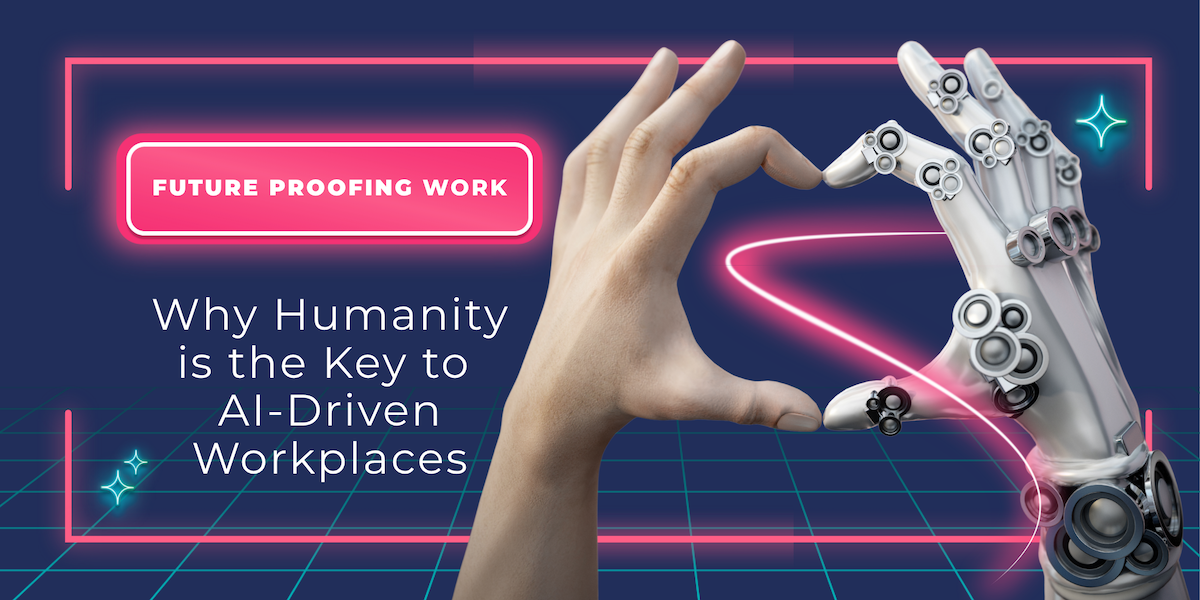
Future Proofing Work: Why Humanity Is the Key to AI-Driven Workplaces
By Hayden Fricke
As artificial intelligence (AI) reshapes the workplace and hybrid work models evolve, a paradoxical truth emerges: to thrive in this digital future, we must create a more human-centric environment. Achieving this will require deliberate action and a fundamental shift in how organisations approach work, leadership, and wellbeing.
The narrative surrounding AI often centres on fear—job losses, automation, and economic disruption. Yet, there is another side to this story. According to a recent report by the Australian Industry Group, over 20% of jobs will undergo fundamental changes by 2030, with a net employment growth of 7% projected between 2025 and 2030.
While some roles will disappear, new opportunities will arise, requiring employees to embrace adaptability through transferable skills. This dual effect of AI underscores the importance of preparing for job transitions while building resilience in the face of uncertainty.
Building this adaptability connects closely with upskilling and reskilling efforts. Organisations must focus on fostering capabilities like creativity, problem-solving, and emotional intelligence—skills essential for navigating evolving job landscapes.
Training programs must align with both current industry trends and the anticipated demands of future work. Importantly, this emphasis benefits both employees and employers. Workers with these competencies can more readily adopt emerging technologies and contribute meaningfully to innovation, securing organisational competitiveness in dynamic markets.
Resilience and Adaptability
The importance of resilience and adaptability was further highlighted during the global pandemic, which brought widespread workplace disruption. Isolation, burnout, and mental health challenges surged, compelling organisations to reconsider their approach to employee wellbeing. Addressing these issues isn’t just ethically sound—it’s financially prudent.
PwC research reveals that every dollar spent on wellbeing yields a $2.40 return. However, the benefits of a robust wellbeing strategy extend beyond financial gains. It fosters trust, loyalty, and engagement among employees, cultivating a workplace where people feel valued and supported.
Future-ready organisations understand that wellbeing extends beyond superficial initiatives. It’s about creating a culture that genuinely prioritises people. Practical steps include offering flexible working arrangements, ensuring access to mental health resources, and promoting open channels for employee feedback. Such initiatives not only address current challenges but also position organisations to thrive in a hybrid work era.
The shift to hybrid work has redefined how teams connect, making intentional efforts to foster collaboration and social interaction more critical than ever. Structured opportunities for mentorship, team-building, and informal communication can counteract feelings of isolation and sustain strong workplace relationships.
Strong Relationships for Effective Leadership
Strong relationships also form the foundation of effective leadership. As Dr Sean Gallagher from Swinburne Centre for New Workforces observes, “The more digital our workplaces become, the more human we need to be.” Similarly, Nemat Shafik, Director of the London School of Economics, notes that future jobs will prioritise empathy and connection. These insights challenge leaders to adopt people-first approaches, focusing on collaboration and trust.
Dr Brené Brown’s research underscores this shift, showing that vulnerability—an often misunderstood trait—is central to building trust and driving innovation. Leaders who embrace their imperfections inspire their teams to engage authentically and contribute creatively. This kind of leadership encourages psychological safety, where employees feel confident experimenting, voicing ideas, and taking calculated risks without fear of judgement. Leaders must model these behaviours, setting the tone for a culture where authenticity and connection flourish.
The transition to hybrid work presents additional challenges and opportunities for leaders. Gone are the days when spontaneous office interactions facilitated connection. Today, leaders must be intentional about creating spaces for collaboration and camaraderie. Informal virtual gatherings, team check-ins, and consistent communication are small but impactful steps in fostering team cohesion. Moreover, leaders should demonstrate inclusivity and respect in all interactions, ensuring every team member feels valued and heard.
Being Human at Work
Being human at work also involves a commitment to authenticity. While it’s natural to feel hesitant about vulnerability, it’s a key component of meaningful relationships and effective leadership. Karissa Thacker’s book, The Art of Authenticity, highlights how today’s workplace demands a deeper psychological sophistication to build trust and achieve shared goals. Organisations can support this by equipping leaders and employees with tools to navigate the nuances of connection and authenticity.
Organisations that prioritise human-centric strategies are not only preparing for the future but shaping it. Talented employees will increasingly gravitate toward workplaces that value empathy, inclusion, and trust. These elements are no longer optional—they’re essential for long-term success in an ever-changing landscape. Furthermore, fostering an environment where employees feel empowered and safe encourages innovation and adaptability, critical for maintaining a competitive edge.
As we navigate the complexities of AI, hybrid work, and workforce transformation, the path forward is clear. Creating more human workplaces ensures resilience and fosters environments where individuals and organisations can thrive. This journey begins with a commitment to lifelong learning, authentic leadership, and a profound respect for the wellbeing and potential of every employee. By focusing on these principles, organisations will not only future-proof their operations but also inspire workplaces that endure and connect in meaningful ways.
References:
- Australian Industry Group: www.aigroup.com.au
- PwC: www.pwc.com.au
- Dr Brene Brown: www.brenebrown.com
- Karissa Thacker: www.karissathacker.com
 About Author Hayden Fricke
About Author Hayden Fricke
Hayden has over 25 years’ experience as a psychologist, predominately in the area of Organisational Psychology. As a Managing Director of Steople, Hayden assists clients with complex business and cultural decisions to achieve measurable outcomes. Contact via hfricke@steople.com.au


